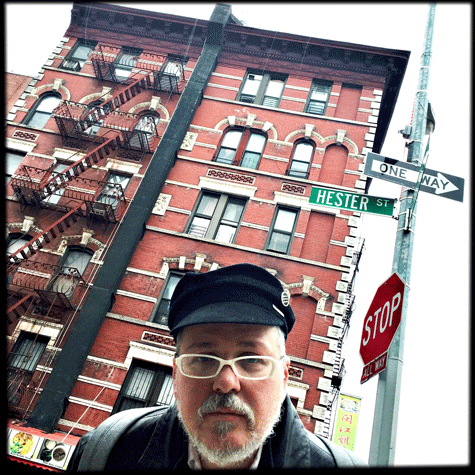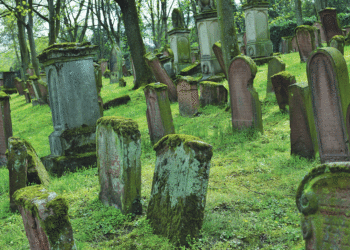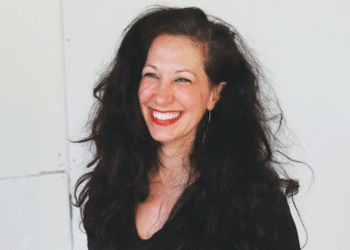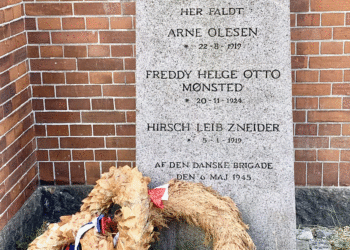Schvitz, delis and Yiddish: Becoming an old Jewish man
by MAX SPARBER
Community News Editor
I’m not quite sure when the moment is that you become old. I don’t think I’m there yet, but I’m almost 50, so I’m getting close. Someone did call me “grandpa” in an online argument the other day, and that has to be a sign that, at the very least, I have exited my youth.

There aren’t any programs for getting older. It’s something we all do, barring tragedy, and all must sort out on our own. One day a beloved item of clothing just feels too young, or an expression we have used all our life sounds creaky. Some people we know seem to be aging gracefully, while others fight it every step of the way, heroically or gracelessly, and who knows which is which?
I suspect most of us, consciously or unconsciously, model getting old on people we have known who seemed to get it right, who seemed like they wore their age well. Some people just seem like they were born to be old.
I have several very particular models, as I am aging into a Jewish old man. My idea of what makes a Jewish old man is certainly outdated, but it is fixed in my head and I’m not likely to replace it with anything else.
When I grew up, there were old Jewish men everywhere. Comedy was dominated by them. If you watched Johnny Carson at night, there would be a parade of gray-haired Jewish men. They would perform five minutes of killer material, honed from years in nightclubs, and then schmooze amiably with Carson for a while.
I saw these men in life as well. My grandfather had a little summer cabin in the Catskill Mountains, and I spent several summers with him. He would bring me to nearby Jewish resorts, then in the waning days of the Borscht Belt, and there they would be: the Carson comics. They would sit poolside at a card table, betting each other and riffing on each other’s comments, and later they would perform.
Unlike their Carson jokes, here they told jokes tailored to the Catskills audiences. The jokes involved Old World Jewish accents, told of Jewish characters, and often ended with a Yiddish punchline. I’d turn to my grandfather to ask what the comic had said, and, choking back years of laughter, he would tell me: “It’s better to learn how to shave on a stranger’s beard.” The punchlines were always idioms, and never made sense to me.
Later I saw these same men again. I moved to Los Angeles in my early 20s and my bus ride to and from work took me through Beverly Hills. Feeling fancy, I decided to have my bank in the neighborhood and, on payday, when I would go to deposit my check, I would eat at a Beverly Hills deli.
This was Nate’n Al, a longstanding Los Angeles show business institution. While I ate, I watched the same parade of Jewish comics come in to eat as I had seen on Carson and later at the Catskills resorts. They were older, but they had the same live wire energy, the same affectionate crankiness, and still ended their jokes with Yiddish punchlines. They gathered together in informal comic jam sessions over lunch, fought over the bill and then went their separate ways. And this is what I thought it meant to be a Jewish old man.
Most of them are gone now, as is a lot of their world. The era of the Catskills ended in the 1980s, and schmaltzy Jewish comics were replaced with edgier young comics about the same time. Those comics are now the elder statesmen of the comedy community, and only Jerry Seinfeld, who likewise grew up listen to funny old Jewish men, seems to have any interest in the generation that preceded him.
Seinfeld’s show, Comedians in Cars Getting Coffee, will sometimes peek in on those old-timers, such as Mel Brooks and Carl Reiner, and when he does, the show turns into Comedians in Delis Getting Tongue Sandwich. In fact, in the Brooks/Reiner episode, they ordered deli food, as I recall, from Nate’n Al’s.
I’m nonetheless determined to age into one of those old men, even if it seems a little dated. Being old means being dated anyway. I have spent the past two years learning Yiddish, and while I can’t claim to be fluent in it, I know as much as the old comics did. I can use it, as they did, as punctuation and punchline.
I took a trip to New York last year and was determined to avail myself of the sorts of Jewish opportunities that I associate with old Jewish men, but are impossible to experience here.
I went to the Russian and Turkish Baths in the East Village for a schvitz, broiling myself in volcanic steam while listening to locals sigh and complain about their lives. Afterward, I had a Russian meal at the bath, consisting of a savory borscht and small Russian pierogies, called varenikis.
I attended a Yiddish-language play and also took a tour of a Yiddish institution, YIVO. And I did a circuit of delis, every time ordering an item that is typically not on the menu at Minnesota delis: the savory schmaltz/matzo meal mix stuffed into an intestine; the fried chicken skin called gribenes. I considered ordering a tongue sandwich, but they are fantastically expensive, and, from what I had seen of a previous generation of Jewish old men, it is more fun to complain about food prices than to eat.
I probably won’t turn into one of these men. I am not a comic, nor am I from the East Coast. I am thoroughly Midwestern, and I have tastes these old comics would have found puzzling: I listen to country music and watch a lot of cowboy movies. I’m more likely to turn into a Ramblin’ Jack Elliott, the Brooklyn-born Jewish boy who grew up to be a cowboy-hatted folk singer.
But, if circumstance ever presents itself, I can still turn bright red in a Russian bath, complain about deli prices, and end the discussion with a Yiddish idiom. I may not be that sort of old Jewish man all the time, but I can be him sometimes.
(American Jewish World, 1.26.18)





















Dear Max,
I enjoyed your article in the Amerian Jewish World and again here on-line. You are not old. You have a Yiddish soul, and that is good. You have Yiddish taste buds, and that is good. And you still have your mind about you.
You are a “kid”, but your zaydeh (grandfather) would be
proud of you. I’m glad to hear you learned some Yiddish.
I have some the same memories you have, but I am a
baubie in my late 70’s. Hopefully, I am one of those people that are aging gracefully (tanks G-t). I like to hang out with
my grandchildren (young teens and college) when they have time for us. I “throw” Yiddish words their way and cook a couple of old fashioned dishes they like. All ages, young, old and in between have something to contribute to life. Also, it helps that I had family from the old country and I grew up on the Northside of Minneapolis, which one researcher call ” The Golden Ghetto.” I hope you come to our Yiddish Vinkl sometime for more Yiddishkeit. It would be fun to see more memories on Yiddish Life Stories in
the AJW.
A sheynem dank,
Annlaee (co-chair of the Yiddish Vinkl group